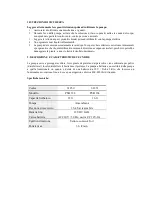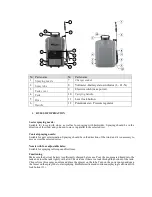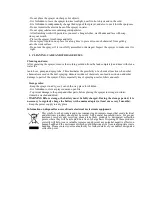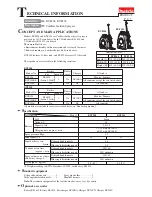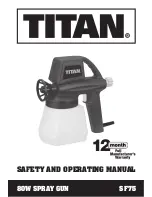
-
Do not place the sprayer on sharp or hot objects.
-
It is forbidden to leave the sprayer in direct sunlight, near fire, hot objects and in the cold.
-
It is forbidden to independently change the design of the sprayer, and also to use it for other purposes.
-
Do not immerse the electric base of the sprayer in water.
-
Do not spray substances containing solid particles.
-
After finishing work with pesticides, you must: change clothes, wash hands and face with soap,
rinse your
mouth.
-
Protect the sprayer from bumps and falls.
-
Do not spray liquid in one place for a long time to prevent too much chemical from getting
onto the work
surface.
-
Do not use the sprayer if it is not fully assembled or damaged. Inspect the sprayer to make sure it is
tight.
5.
CLEANING, CARE AND STORAGE RULES
Cleaning and care:
After operating the sprayer, remove the working solution from the tank completely and rinse with clean
water the
tank, hose, pump and spray tube. This eliminates the possibility of a chemical reaction when other
chemicals are
used in the next spraying. Remote residues of chemicals can lead to corrosion and other
damage to parts of the
sprayer. This is especially true of spraying nozzles, filters and seals.
Storage rules:
-
Keep the sprayer in a dry, cool, out-of-the-way place for children.
-
It is forbidden to store a sprayer near an open fire.
-
To prevent damage to the pump and other parts, before placing the sprayer in storage in winter,
it must be
washed and dried.
- WARNING Before storage, the battery must be fully charged. During the storage period, it is
necessary to regularly charge the battery with a mains adapter (at least once every 2 months).
- Keep the power supply in a dry place.
Information on disposal for users of waste electrical & electronic equipment.
This symbol on the products and/or accompanying documents means that used electrical
and electronic products should not be mixed with general household waste. For proper
treatment, recovery and recycling, please take these products to designated collection
points, where they will be accepted on a free of charge basis. Disposing of these products
correctly will help to save valuable resources and prevent any potential negative effects on
human health and the environment which could otherwise arise from inappropriate waste
handling. Please contact your local authority for further details of your nearest designated
collection point.


